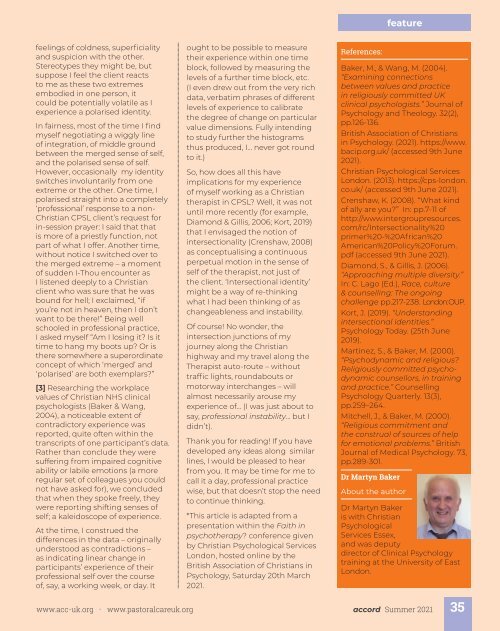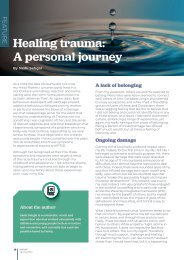ACC Accord Summer 2021 Issue 111
Create successful ePaper yourself
Turn your PDF publications into a flip-book with our unique Google optimized e-Paper software.
feature<br />
feelings of coldness, superficiality<br />
and suspicion with the other.<br />
Stereotypes they might be, but<br />
suppose I feel the client reacts<br />
to me as these two extremes<br />
embodied in one person, it<br />
could be potentially volatile as I<br />
experience a polarised identity.<br />
In fairness, most of the time I find<br />
myself negotiating a wiggly line<br />
of integration, of middle ground<br />
between the merged sense of self,<br />
and the polarised sense of self.<br />
However, occasionally my identity<br />
switches involuntarily from one<br />
extreme or the other. One time, I<br />
polarised straight into a completely<br />
‘professional’ response to a non-<br />
Christian CPSL client’s request for<br />
in-session prayer: I said that that<br />
is more of a priestly function, not<br />
part of what I offer. Another time,<br />
without notice I switched over to<br />
the merged extreme – a moment<br />
of sudden I-Thou encounter as<br />
I listened deeply to a Christian<br />
client who was sure that he was<br />
bound for hell; I exclaimed, “if<br />
you’re not in heaven, then I don’t<br />
want to be there!” Being well<br />
schooled in professional practice,<br />
I asked myself “Am I losing it? Is it<br />
time to hang my boots up? Or is<br />
there somewhere a superordinate<br />
concept of which ‘merged’ and<br />
‘polarised’ are both exemplars?”<br />
[3] Researching the workplace<br />
values of Christian NHS clinical<br />
psychologists (Baker & Wang,<br />
2004), a noticeable extent of<br />
contradictory experience was<br />
reported, quite often within the<br />
transcripts of one participant’s data.<br />
Rather than conclude they were<br />
suffering from impaired cognitive<br />
ability or labile emotions (a more<br />
regular set of colleagues you could<br />
not have asked for), we concluded<br />
that when they spoke freely, they<br />
were reporting shifting senses of<br />
self; a kaleidoscope of experience.<br />
At the time, I construed the<br />
differences in the data – originally<br />
understood as contradictions –<br />
as indicating linear change in<br />
participants’ experience of their<br />
professional self over the course<br />
of, say, a working week, or day. It<br />
ought to be possible to measure<br />
their experience within one time<br />
block, followed by measuring the<br />
levels of a further time block, etc.<br />
(I even drew out from the very rich<br />
data, verbatim phrases of different<br />
levels of experience to calibrate<br />
the degree of change on particular<br />
value dimensions. Fully intending<br />
to study further the histograms<br />
thus produced, I… never got round<br />
to it.)<br />
So, how does all this have<br />
implications for my experience<br />
of myself working as a Christian<br />
therapist in CPSL? Well, it was not<br />
until more recently (for example,<br />
Diamond & Gillis, 2006; Kort, 2019)<br />
that I envisaged the notion of<br />
intersectionality (Crenshaw, 2008)<br />
as conceptualising a continuous<br />
perpetual motion in the sense of<br />
self of the therapist, not just of<br />
the client. ‘Intersectional identity’<br />
might be a way of re-thinking<br />
what I had been thinking of as<br />
changeableness and instability.<br />
Of course! No wonder, the<br />
intersection junctions of my<br />
journey along the Christian<br />
highway and my travel along the<br />
Therapist auto-route – without<br />
traffic lights, roundabouts or<br />
motorway interchanges – will<br />
almost necessarily arouse my<br />
experience of… (I was just about to<br />
say, professional instability… but I<br />
didn’t).<br />
Thank you for reading! If you have<br />
developed any ideas along similar<br />
lines, I would be pleased to hear<br />
from you. It may be time for me to<br />
call it a day, professional practice<br />
wise, but that doesn’t stop the need<br />
to continue thinking.<br />
*This article is adapted from a<br />
presentation within the Faith in<br />
psychotherapy? conference given<br />
by Christian Psychological Services<br />
London, hosted online by the<br />
British Association of Christians in<br />
Psychology, Saturday 20th March<br />
<strong>2021</strong>.<br />
References:<br />
Baker, M., & Wang, M. (2004).<br />
“Examining connections<br />
between values and practice<br />
in religiously committed UK<br />
clinical psychologists.” Journal of<br />
Psychology and Theology. 32(2),<br />
pp.126-136.<br />
British Association of Christians<br />
in Psychology. (<strong>2021</strong>). https://www.<br />
bacip.org.uk/ (accessed 9th June<br />
<strong>2021</strong>).<br />
Christian Psychological Services<br />
London. (2013). https://cps-london.<br />
co.uk/ (accessed 9th June <strong>2021</strong>).<br />
Crenshaw, K. (2008). “What kind<br />
of ally are you?” In: pp.7-11 of<br />
http://www.intergroupresources.<br />
com/rc/Intersectionality%20<br />
primer%20-%20African%20<br />
American%20Policy%20Forum.<br />
pdf (accessed 9th June <strong>2021</strong>).<br />
Diamond, S., & Gillis, J. (2006).<br />
“Approaching multiple diversity.”<br />
In: C. Lago (Ed.), Race, culture<br />
& counselling: The ongoing<br />
challenge pp.217-238. London: OUP.<br />
Kort, J. (2019). “Understanding<br />
intersectional identities.”<br />
Psychology Today. (25th June<br />
2019).<br />
Martinez, S., & Baker, M. (2000).<br />
“Psychodynamic and religious?<br />
Religiously committed psychodynamic<br />
counsellors, in training<br />
and practice.” Counselling<br />
Psychology Quarterly. 13(3),<br />
pp.259–264.<br />
Mitchell, J., & Baker, M. (2000).<br />
“Religious commitment and<br />
the construal of sources of help<br />
for emotional problems.” British<br />
Journal of Medical Psychology. 73,<br />
pp.289-301.<br />
Dr Martyn Baker<br />
About the author<br />
Dr Martyn Baker<br />
is with Christian<br />
Psychological<br />
Services Essex,<br />
and was deputy<br />
director of Clinical Psychology<br />
training at the University of East<br />
London.<br />
www.acc-uk.org • www.pastoralcareuk.org accord <strong>Summer</strong> <strong>2021</strong><br />
35



